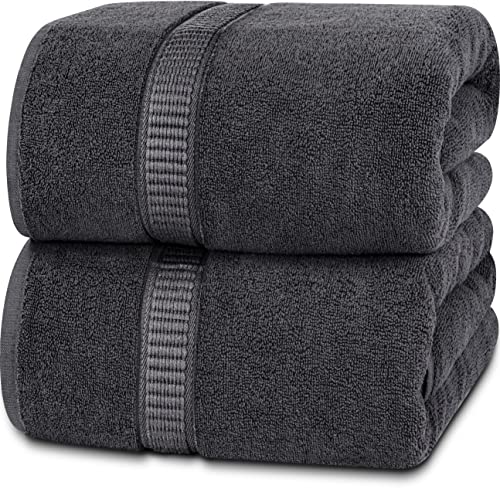


Keeping your towels clean and fresh is an essential part of maintaining good hygiene in your home. However, when it comes to washing different types of towels, such as kitchen towels and bath towels, you may wonder if it’s safe to combine them in the same load.
According to experts, while it may be tempting to toss all your towels together to save time and energy, it’s recommended to separate kitchen towels from bath towels. Kitchen towels are often used to wipe up spills, clean countertops, and dry dishes, which means they may contain bacteria, grease, and food particles. On the other hand, bath towels are used to dry off after a bath or shower and are likely to come into contact with your skin.
By washing kitchen towels separately from bath towels, you can prevent cross-contamination and ensure that your bath towels remain clean and safe to use. Additionally, experts suggest washing kitchen towels at a higher temperature to kill any bacteria that may be present. Using a good quality detergent, such as one that contains bleach or enzymes, can also help to remove stains and eliminate odors.
Why You Shouldn’t Combine Kitchen Towels with Bath Towels
While it may be tempting to throw all your towels into the washing machine together, it’s not a good idea to combine kitchen towels with bath towels. Here are a few reasons why:
1. Cross-Contamination
Combining kitchen towels with bath towels can lead to cross-contamination. Kitchen towels are often used to clean up spills, wipe countertops, and dry dishes, which can expose them to harmful bacteria, grease, and food particles. Washing them with bath towels that come into contact with your body can transfer these contaminants, potentially leading to hygiene issues.
2. Odor Transfer
Kitchen towels can absorb strong odors from cooking, such as garlic or fish. When washed together with bath towels, these odors can transfer, leaving your bath towels smelling less than fresh. Nobody wants to dry off with a towel that smells like last night’s dinner!
3. Staining
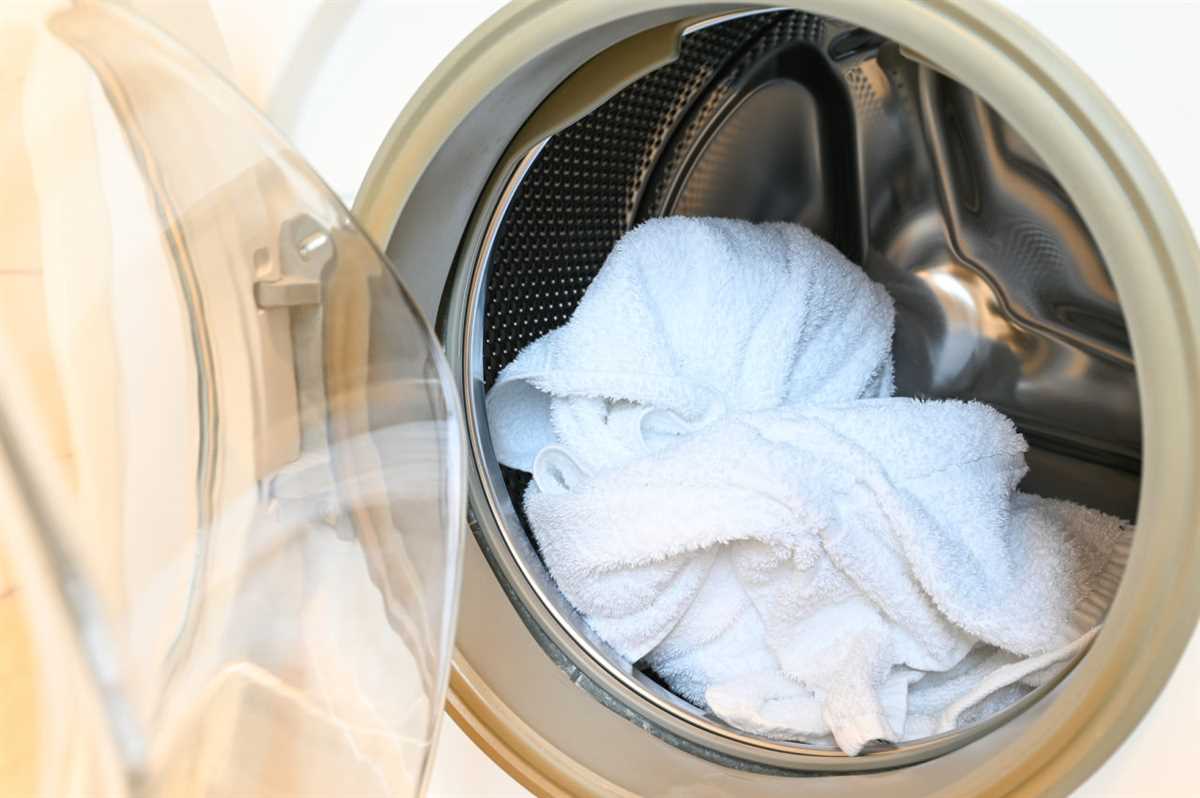
Kitchen towels are prone to stains from food, spices, and other cooking substances. These stains can easily transfer to bath towels, causing unsightly marks that are difficult to remove. Keeping your kitchen towels separate from bath towels can help preserve the appearance of your bathroom linens.
4. Different Fabric Needs
Kitchen towels and bath towels are often made from different fabrics to accommodate their unique purposes. Kitchen towels are designed to be more absorbent and durable to handle spills and heavy cleaning, while bath towels are typically softer and more luxurious against the skin. Washing them together may not give each fabric the care it needs to maintain its quality over time.
5. Hygiene Concerns
Lastly, combining kitchen towels with bath towels can raise hygiene concerns. Bath towels may come into contact with sensitive areas of the body, such as the face or intimate areas, which makes it important to keep them clean and free from potential contaminants. Washing them separately ensures that your bath towels maintain their cleanliness and integrity.
In conclusion, it is best to keep kitchen towels separate from bath towels when doing laundry. By doing so, you can prevent cross-contamination, avoid odor transfer and staining, cater to different fabric needs, and prioritize hygiene. Maintaining separate laundry loads for kitchen towels and bath towels will help keep your linens fresh, clean, and in good condition for longer.
Hygiene Concerns
When it comes to combining washing kitchen towels with bath towels, there are some hygiene concerns to consider. Kitchen towels are typically used for cleaning up spills, drying dishes, and wiping hands, while bath towels are used for drying the body after bathing or showering. These two types of towels come into contact with different types of dirt and bacteria.
Because kitchen towels are often used in a food preparation area, they can become contaminated with bacteria such as E. coli and Salmonella from raw meat, poultry, and other food products. This makes it important to wash kitchen towels separately from bath towels to prevent the spread of these harmful bacteria.
In addition to bacteria, kitchen towels can also become dirty and stained with food particles, grease, and other debris. Washing them together with bath towels may result in cross-contamination and transfer of these stains and dirt to the bath towels.
Furthermore, using the same towels for both kitchen and bath purposes can cause unpleasant odors. The smells of food and cleaning chemicals can get trapped in the fibers of the towels, making them less appealing for use in a bathroom or on clean bodies.
To maintain proper hygiene and prevent the spread of bacteria, it is recommended to wash kitchen towels separately from bath towels. This ensures that any potential contamination or stains from the kitchen are not transferred to the bath towels.
Cross-Contamination Risks
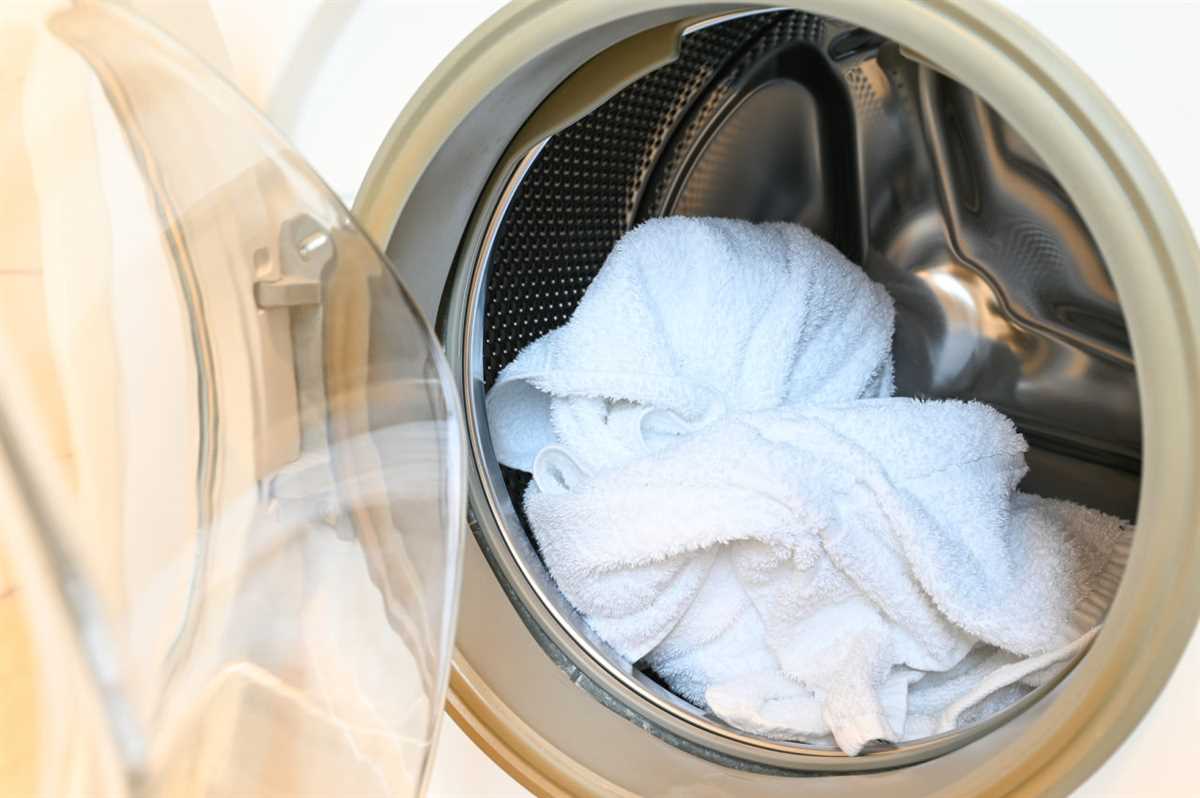
Combining kitchen towels with bath towels during washing can pose cross-contamination risks. This is due to the fact that kitchen towels are exposed to various types of bacteria and other pathogens from raw food, spills, and handling dirty surfaces. If these towels are mixed with bath towels, there is a possibility that the bacteria present on the kitchen towels can transfer to the bath towels.
While most bacteria are harmless, some can cause foodborne illnesses or infections if they come into contact with open wounds or are consumed. The risk of cross-contamination can increase if the kitchen towels are not properly cleaned or if they are used to wipe surfaces that have come into contact with raw meat or other potentially contaminated substances.
It is important to note that bath towels are typically used to dry clean bodies and are not exposed to the same types of bacteria as kitchen towels. Mixing the two types of towels during washing can therefore introduce foreign bacteria to the bath towels, potentially compromising their hygiene.
To reduce the risk of cross-contamination, it is recommended to separate kitchen towels from bath towels during washing. Kitchen towels should be washed separately, using hot water and an appropriate detergent to kill any bacteria present. It is also advisable to wash kitchen towels on a regular basis to ensure cleanliness and prevent the buildup of harmful bacteria.
Additionally, it is important to maintain good hygiene practices in the kitchen, such as regularly washing hands before handling kitchen towels and using separate towels for different tasks, such as cleaning surfaces and drying dishes. Keeping kitchen towels clean and properly sanitized can help minimize the risk of cross-contamination and promote a healthy environment in the home.
By being aware of the cross-contamination risks and taking appropriate precautions, it is possible to maintain a safe and clean kitchen and bathroom environment.
Kitchen Germs and Bath Essentials
Kitchen Germs
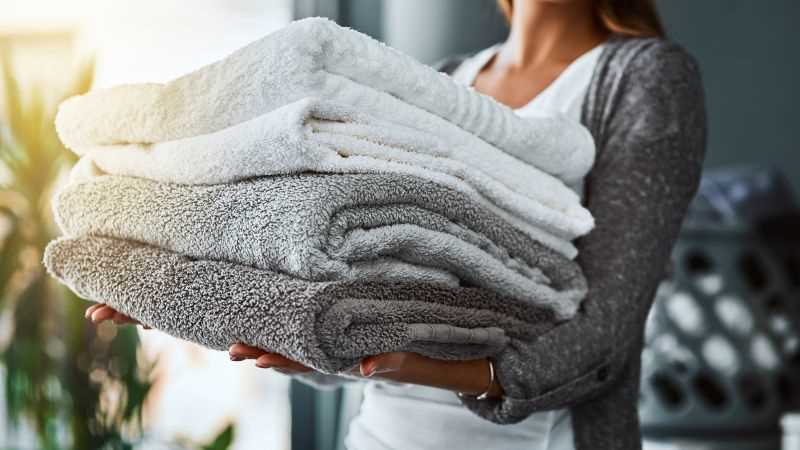
In the kitchen, germs can easily accumulate on various surfaces, including kitchen towels. These towels are often used to wipe up spills, clean countertops, and handle raw food, making them a potential breeding ground for bacteria.
Unlike bath towels, which are mainly used for drying off clean bodies, kitchen towels come into direct contact with food and potentially harmful bacteria. This makes it essential to maintain proper hygiene and cleanliness in the kitchen.
Bath Essentials
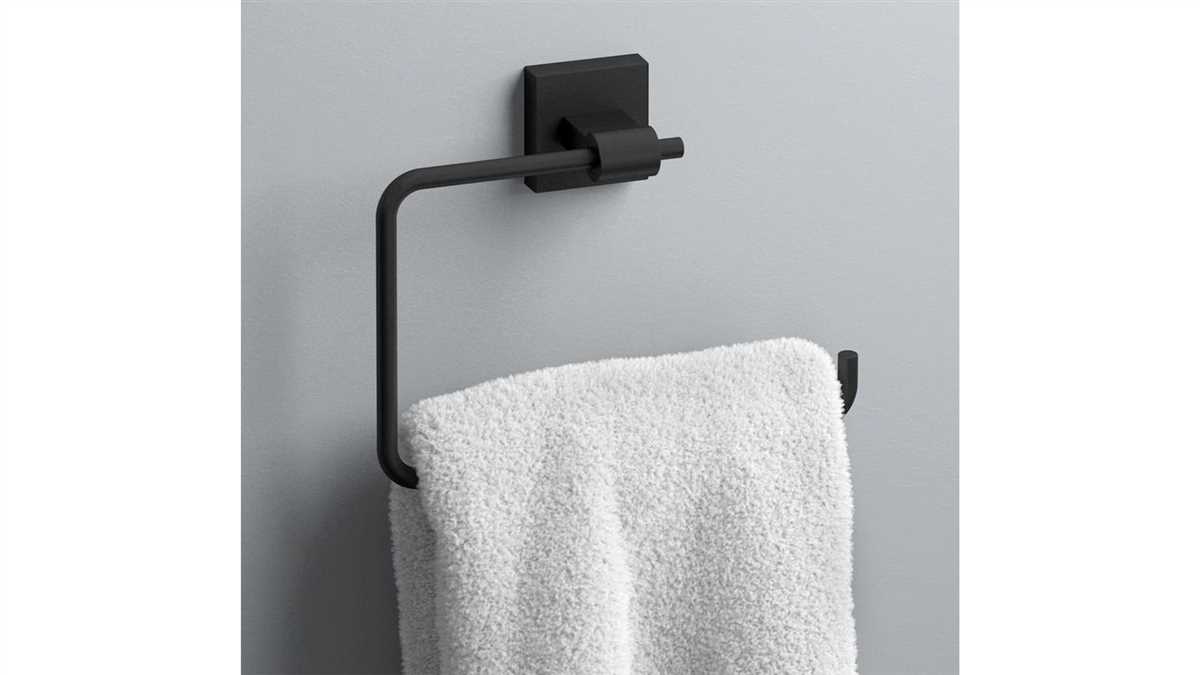
Bath towels serve a different purpose than kitchen towels. They are primarily used for drying off after bathing or showering, and since they come into contact with clean bodies, they typically harbor fewer bacteria than kitchen towels.
It is crucial to regularly wash bath towels to prevent the growth of bacteria and maintain good hygiene. Washing them separately from kitchen towels helps to minimize the risk of cross-contamination and ensure that no harmful bacteria transfer from the kitchen to the bathroom.
Combining Washing
While it may be tempting to combine the washing of kitchen towels and bath towels to save time and water, it is generally recommended to wash them separately. This is because kitchen towels may contain harmful bacteria that can contaminate bath towels during the washing process, increasing the risk of spreading germs.
By washing kitchen towels separately on a higher temperature setting, you can help kill bacteria effectively, reducing the chances of cross-contamination. It is also advisable to choose a suitable detergent that can effectively remove stains and kill germs.
Tips for Keeping Kitchen Towels Clean
- Wash kitchen towels frequently – ideally after every use, especially if they come into direct contact with raw meat, poultry, or fish.
- Use hot water and an appropriate detergent to kill bacteria effectively.
- Avoid using fabric softeners, as they can reduce the towel’s absorbency and trap bacteria.
- Dry kitchen towels thoroughly in a well-ventilated area or using a dryer to prevent the growth of mold and mildew.
Conclusion
While it may seem convenient to combine the washing of kitchen towels with bath towels, it is advisable to wash them separately. Kitchen towels are more likely to harbor harmful bacteria due to their direct contact with food, making it crucial to maintain proper hygiene in the kitchen. By washing kitchen towels separately on a higher temperature setting, you can effectively kill bacteria and minimize the risk of cross-contamination.
Expert Advice: How to Properly Wash Towels
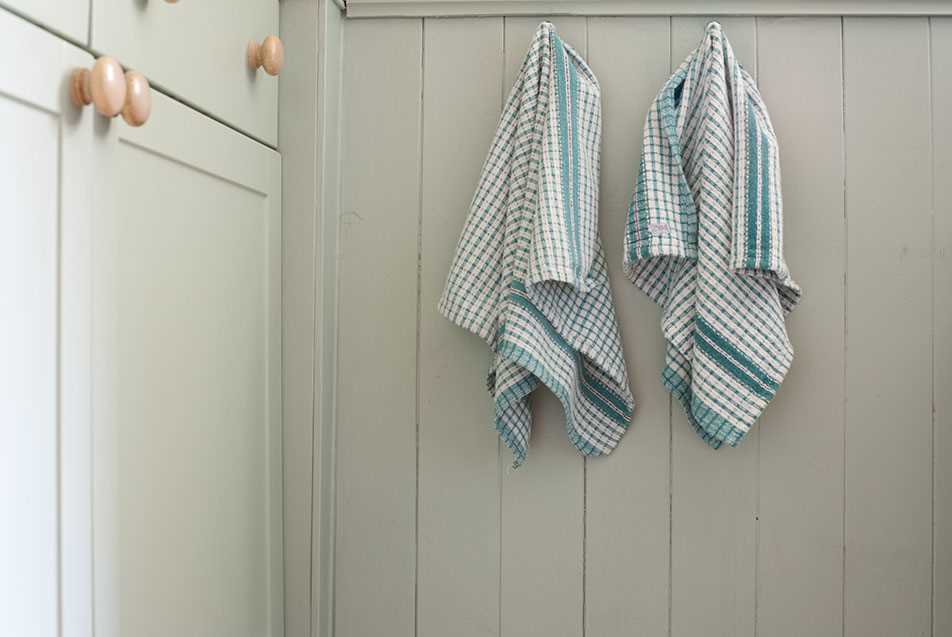
When it comes to washing towels, it is important to follow proper care instructions to ensure that they remain clean, fresh, and long-lasting. Here are some expert tips on how to properly wash your towels:
- Separate by Color: Before washing your towels, separate them by color to prevent bleeding. This means washing white towels separately from colored towels to avoid any color transfer.
- Load Size: It is advisable to wash towels in smaller loads to allow them to move freely and be thoroughly cleaned. Overloading the washing machine can result in ineffective cleaning and damage to your towels.
- Temperature: Check the care label on your towels for temperature recommendations. Generally, it is best to wash towels in warm water, around 40-60 degrees Celsius, to remove oils and dirt effectively.
- Detergent: Use a high-quality detergent suitable for your towels. Avoid using too much detergent as it can leave residue on the towels, causing them to become stiff and less absorbent over time. Follow the manufacturer’s instructions for the recommended amount.
- Softener: While fabric softeners can make towels feel fluffy and soft, they can also reduce their absorbency. If you prefer to use a fabric softener, use it sparingly or opt for natural alternatives such as white vinegar, which can help eliminate odors and restore softness.
- Drying: To preserve the absorbency and softness of your towels, dry them on a medium heat setting. Overdrying can make towels stiff and rough. If possible, avoid using dryer sheets as they can leave a residue on the towels.
- Frequent Washing: Towels should be washed regularly, ideally after every 3-4 uses, to prevent the buildup of bacteria and odors. Be mindful of any stains or spills on your towels and treat them promptly to ensure they come out during the wash.
By following these expert tips, you can keep your towels clean, fresh, and in excellent condition for a long time. Remember to also check the care label on your towels for any specific instructions from the manufacturer.
FAQ
Is it safe to wash kitchen towels and bath towels together?
Yes, it is safe to wash kitchen towels and bath towels together as long as they are all made from similar materials and are not heavily soiled. However, it is recommended to wash them separately to maintain hygiene.
What are the potential risks of washing kitchen towels and bath towels together?
Washing kitchen towels and bath towels together can potentially transfer bacteria and odors from the kitchen to the bathroom. Additionally, if the towels are heavily soiled, it can result in cross-contamination. Therefore, it is best to wash them separately.
Can washing kitchen towels with bath towels affect the cleanliness of the towels?
Yes, washing kitchen towels with bath towels can affect the cleanliness of the towels. Kitchen towels may contain food particles and grease, which can transfer to the bath towels during the wash cycle. To ensure clean and hygienic towels, it is recommended to wash them separately.
What precautions should I take if I decide to wash kitchen towels and bath towels together?
If you decide to wash kitchen towels and bath towels together, it is important to ensure that they are all relatively clean and not heavily soiled. You should also use hot water and a good quality detergent to help kill any bacteria. After washing, make sure to dry the towels thoroughly to prevent the growth of mold and mildew.











